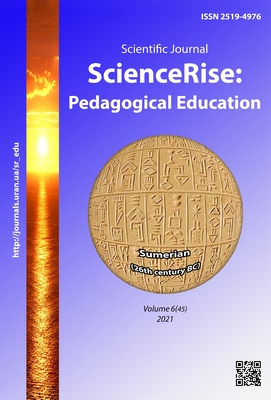Formative assessment as a means of forming the pupil's learning trajectory
DOI:
https://doi.org/10.15587/2519-4984.2021.247725Keywords:
formative assessment, individual educational trajectory, assessment planning, feedbackAbstract
The article examines the types of assessment in the modern school. The importance of formative assessment for the formation and development of personality, to achieve the designed learning outcomes, their correction and selection of tasks for individual work by each pupil to improve results is analyzed. Models of teaching in a modern school are described, and those that promote the development of individuals with «growth intelligence», for which formative assessment is used, are identified. The authour determines the principles and functions of formative assessment, the methods of formative assessment and the list of most often used methods in practice by teachers. Particular attention is paid to the benefits of using digital tools for formative assessment and to the fact of their active use by teachers, especially in blended learning. The paper proposes to design the assessment process: designing assessment by a teacher in a course and in a topic with the creation of a visualized plan for pupils and designing assessment in class with pupils through joint setting of diagnostic goals, involving pupils in planning learning activities in accordance with principles of systematicity, planning, differentiation. The value of feedback for the formation of an individual educational trajectory is determined and the conditions of its effectiveness are given. The paper notes the importance of both formative and final assessment and their integrated use: formative assessment – to provide feedback and correction of learning, final – to record learning outcomes. Conclusions are made on improving the progress of pupils in learning when planning a course, topic and lesson, which includes assessment planning, with the active position of each, conscious participation in the creation of the educational process, adjusting their own trajectory
References
- Morze, N. V., Barna, O. V., Vember, V. P. (2013). Formuvalne otsiniuvannia: vid teorii do praktyky. Informatyka ta informatsiini tekhnolohii v navchalnykh zakladakh, 6, 45–57.
- Lokshyna, O. I. (2009). Zmist shkilnoi osvity v krainakh Yevropeiskoho Soiuzu: teoriia i praktyka (druha polovyna XX– pochatok XXI st.). Kyiv, 404.
- Liashenko, O. I., Zhuk, Yu. O. (2014). Testovi tekhnolohii otsiniuvannia kliuchovykh i predmetnykh kompetentnostei uchniv osnovnoi i starshoi shkoly. Kyiv, 200.
- Khutorskoi, A. V. (2002). Kliuchevye kompetentsii i obrazovatelnye standarty. Eidos, 2, 58–64.
- Perrenoud, P. (1991). Towards a pragmatic approach to formative evaluation. Assessment of pupils’ achievements: Motivation and school success. Amsterdam: Swets and Zeitlinger. 79–101.
- Cowie, B., Bell, B. (1999). A Model of Formative Assessment in Science Education. Assessment in Education: Principles, Policy & Practice, 6 (1), 101–116. doi: http://doi.org/10.1080/09695949993026
- Black, P. (2000). Formative Assessment and Curriculum Consequences. Curriculum and Assessment, 7–24.
- Mayes, T., De Freitas, S. (2004). Review of e-learning theories, frameworks and models. London: Joint Information Systems Committee, 43.
- Shepard, L. A. (2000). The Role of Assessment in a Learning Culture. Educational Researcher, 29 (7), 4–14. doi: http://doi.org/10.3102/0013189x029007004
- Smith, A., Lovatt, M., Wise, D. (2003). Accelerated Learning. Network Educational Press Ltd.
- Zahalni kryterii otsiniuvannia navchalnykh dosiahnen uchniv u systemi zahalnoi serednoi osvity (2008). Available at: https://ru.osvita.ua/school/estimation/2358/
- Kaban, L. (2017). Formative Assessment of the Learning Activities of the Students in the Project of New Ukrainian School. Narodna osvita, 1 (31). Available at: https://www.narodnaosvita.kiev.ua/?page_id=4471
- Pro osvitu (2017). Zakon Ukrainy No. 2145-VIII. 05.09.2017. Available at: http://ru.osvita.ua/legislation/law/2231/
- Trumbull, E., Lash, A. (2013). Understanding Formative Assessment: Insights from Learning Theory and Measurement Theory. Available at: https://www.wested.org/online_pubs/resource1307.pdf
- Trumbull, E., & Rothstein-Fisch, C. (2011). The intersection of culture and achievement motivation. The School Community Journal, 21(2), 25–53.
- Metodychni rekomendatsii shchodo osoblyvostei orhanizatsii osvitnoho protsesu u pershomu (adaptyvnomu) tsykli / 5 klasakh zakladiv zahalnoi serednoi osvity za Derzhavnym standartom bazovoi serednoi osvity v umovakh realizatsii kontseptsii «Nova ukrainska shkola» (2021). Available at: http://ru.osvita.ua/legislation/Ser_osv/83419/
Downloads
Published
How to Cite
Issue
Section
License
Copyright (c) 2021 Halyna Voitkiv, Igor Lishchynskyy

This work is licensed under a Creative Commons Attribution 4.0 International License.
Our journal abides by the Creative Commons CC BY copyright rights and permissions for open access journals.
Authors, who are published in this journal, agree to the following conditions:
1. The authors reserve the right to authorship of the work and pass the first publication right of this work to the journal under the terms of a Creative Commons CC BY, which allows others to freely distribute the published research with the obligatory reference to the authors of the original work and the first publication of the work in this journal.
2. The authors have the right to conclude separate supplement agreements that relate to non-exclusive work distribution in the form in which it has been published by the journal (for example, to upload the work to the online storage of the journal or publish it as part of a monograph), provided that the reference to the first publication of the work in this journal is included.







